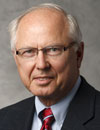The St. Thomas School of Education is the new authorizer of four additional charter schools in the Twin Cities area, bringing to six the number of charter schools involved with the university.
The new schools are the Main Street School of Performing Arts in Hopkins and Community of Peace, Twin Cities Academy and Twin Cities Academy High School, all in St. Paul. St. Thomas will remain the authorizer of Academia Cesar Chavez and HOPE Community Academy, also in St. Paul.
State law requires that the 150 charter schools in Minnesota have a contract with an “authorizer,” such as a college, university, school district or nonprofit organization, to monitor their academic and financial performance and shape their governance structure. St. Thomas faculty and administrators serve on a charter school accountability board, which meets monthly to review the schools’ performances.
Dr. Bruce Kramer, dean of the College of Applied Professional Studies, is grateful for Minnesota Department of Education approval of the four additional charter schools and believes they are a natural fit for the School of Education.
“This is consistent with our history of engagement with the community,” Kramer said. “It is a tremendous opportunity to engage with a major movement in school reform. Even more importantly, it involves our faculty and staff, at a fundamental level, in solving key educational problems and in answering the question, ‘How do you provide a meaningful education’?”
In 1991, Minnesota became the first state to pass legislation enabling charter schools, which are public schools. St. Thomas agreed in 2000 to serve as “sponsor” – a role that since has been redefined as “authorizer” – of Academia Cesar Chavez, HOPE Community Academy and the McGee Institute of Technology, which closed in 2005.
Status as an authorizer does not mean financial support, but St. Thomas will monitor each school’s effectiveness, consult with the state regarding academic performance and hold the school accountable for positive results in student learning.
“Our oversight as an authorizer will be more hands-on than when we were a sponsor,” said Dr. Dave Peterson, who teaches in the Leadership, Policy and Administration Department in the School of Education and coordinates St. Thomas’ charter school efforts. “Authorizers have an increased level of accountability which requires additional resources to ensure that charter schools meet their mission of improving student learning.”
The St. Thomas President’s Staff last year approved Kramer’s proposal to authorize up to seven new charter schools. The School of Education received 11 applications, reduced the number to five after site visits and reviews, and settled on four. Other schools could be added in the future.
The School of Education’s authorizing philosophy mirrors the mission statements of the school and the university, emphasizing an education that promotes moral responsibility, critical thinking, wise action and skillful work in an effort to advance the common good.
“We wanted to make sure these schools knew what they would be buying into,” Kramer said. “They needed to understand our mission and that they are part of it even though they are not, technically, part of the university. I think we have achieved that with these new schools.”
Here is a snapshot look at the six charter schools:
Academic Cesar Chavez, 1800 Ames Ave., St. Paul. It opened in 2001 as an outgrowth of the 10-year-old Hispanic Pre-College Project at St. Thomas, and seeks to educate bilingual and bi-literate students by advocating Latino cultural values. The school enrolls 320 students in grades K-6. Its executive director, Ramona de Rosales, started the Hispanic Pre-College Project at St. Thomas and has a master’s degree in educational leadership and administration from the university.
Community of Peace Academy, 471 E. Magnolia Ave., St. Paul. This K-12 school with 700 students opened in 1995 and is considered one of the most successful charter schools in the country, Kramer said. The school focuses on social justice issues, and its founder, executive director and K-6 principal Karen Rusthoven, has her Ed.D degree from St. Thomas. St. Paul Public Schools formerly sponsored Community of Peace.
HOPE (Hmong Open Partnerships in Education) Community Academy, 720 Payne Ave., St. Paul. It opened in 2000 as K-3 school, added grade levels annually and today enrolls 460 students in grades K-8, with a goal of mastering fundamental skills while instilling the finest Hmong and American values.
Main Street School of Performing Arts (MSSPA), 1320 Main St., Hopkins. Its curriculum is built around the arts, with 260 students in grades 9-12. “It’s incredible how the teachers, students and staff relate to each other,” Peterson said, “and the depth of their commitment to the school is remarkable.” Hopkins Public Schools previously sponsored the school, which was established in 2004 by the Stages Theatre Co. Barbara Wornson, who is completing her Ed.D studies at St. Thomas, is the school’s executive director.
Twin Cities Academy, 835 E. Fifth St., St. Paul. This college preparatory middle school (grades 6-8) opened in 1999 with a “core knowledge” curriculum and consistently earns high marks from the state for academic achievement in reading and mathematics. The school enrolls 200 students, and St. Paul Public Schools was its former sponsor.
Twin Cities Academy High School, 835 E. Fifth St., St. Paul. The college-preparatory school opened in 2006, also sponsored by St. Paul Public Schools, and emphasizes a learning environment with an emphasis on academic rigor, leadership development and character building. Ninety-six percent of seniors graduated in 2010 and 82 percent enrolled in college. About 120 students are enrolled.
“We are pleased with the mix of charter schools that we will authorize,” said Kramer, who praised Peterson’s work in coordinating the review of the charter school applications. “We have real diversity – in curriculum, cultures, ethnic and racial backgrounds, and grade levels.”
Last year, the Minnesota Department of Education selected St. Thomas as the first college or university to receive certification to provide leadership development training for charter-school board members. The training program is a collaboration between the Center for Business Excellence and Center for Nonprofit Management in the Opus College of Business.








